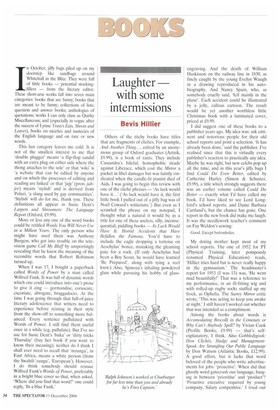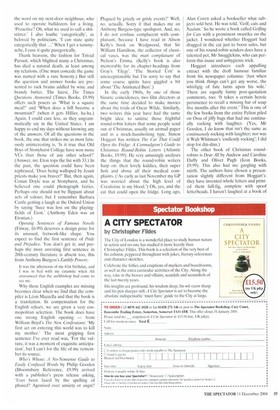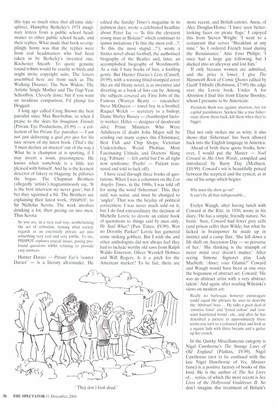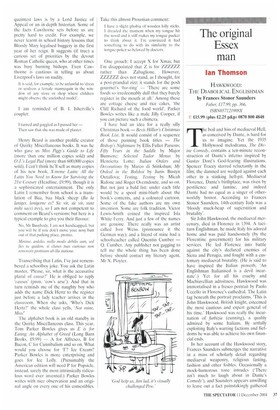Laughter with some intermissions
Bevis Hillier
Jn October, jiffy bags piled up on my doorstep like sandbags around Whitehall in the Blitz. They were full of little books — potential stockingfillers — from the literary editor. These short-arse works fall into seven main categories: books that are funny; books that are meant to be funny; collections of lists; question and answer books; anthologies of quotations; works I can only class as Quirky Miscellaneous; and (especially in vogue after the success of Lynne Truss's Eats, Shoots and Leaves), books on niceties and nastecies of the English language and on rare or new words.
This last category leaves me cold. It is not of the smallest interest to me that 'double plugger' means 'a flip-flop sandal with an extra plug on either side where the thong attaches to the sole' or that ‘wiki' is 'a websitc that can be edited by anyone and on which the processes of editing and reading are linked' or that `jujy' (pron. juhjee) means 'stylish' and is derived from Polari, 'a slang used by gay communities'. 'Stylish' will do for me, thank you. These definitions all appear in Susie Dent's Larpers and Shroomers: The Language Report (Oxford, £9.99).
More or less any one of the word books could be retitled Words You Will Never Use in a Million Years. The only person who might have used them was Anthony Burgess, who got into trouble on the television game Call My Bluff by unsportingly revealing that he knew the meaning of the recondite words that Robert Robinson turned up.
When I was 17, I bought a paperback called Words of Power by a man called Wilfred Funk. It was full of dynamic words which one could introduce into one's prose to give it zing — gormandise, coruscate, excoriate, abrogate, braggadocio. At the time I was going through that full-of-juice literary adolescence that writers need to experience before reining in their style from the show-off to something more balanced. Every sentence pullulated with Words of Power. I still find them useful once in a while (eg, pullulate). But I've no use for Susie Dent's tuka' or 'dirty tricks Thursday' (buy her book if you want to know their meaning); neither do I think I shall ever need to recall that 'mzungu', in East Africa, means a white person (from the Swahili `zungu', 'European). However, I do think somebody should reissue Wilfred Funk's Words of Power, preferably in a bright blue cover so that, when asked, 'Where did you find that word?' one could reply, 'In a blue Funk.' Others of the titchy books have titles that are fragments of clichés. For example, And Another Thing..., edited by an anonymous group of Oxford graduates (Artnik, £9.99), is a book of rants. They include Cassandra's bileful, homophobic tirade against Liberace., which cost the Mirror a packet in libel damages hut was faintly vindicated when the candle-lit pianist died of Aids. I was going to begin this review with one of the cliché phrases — 'As luck would have it...' ('As luck would have it, the first little book I pulled out of a jiffy bag was of Noel Coward's witticisms.') But even as I scrawled the phrase on my notepad, I thought what a natural it would be as a title for one of these useless, silly, inconsequential, piddling books — As Luck Would Have It: Horrid Accidents that Have Befallen the Famous. You'd have to include the eagle dropping a tortoise on Aeschylus' bonce, mistaking the gleaming pate for a rock. (If only Aeschylus had been a Boy Scout, he would have learned 'Be Prepared', along with tying a reef knot.) Also, Spinoza's inhaling powdered glass while pursuing his hobby of glass engraving. And the death of William Huskisson on the railway line in 1830, as finely caught by the young Evelyn Waugh in a drawing reproduced in his autobiography. And Nancy Spain, who, as somebody cruelly said, 'fell mainly in the plane'. Each accident could be illustrated by a jolly, callous cartoon. The result would be yet another worthless little Christmas book with a laminated cover, priced at £9.99.
I did suggest one of these books to a publisher years ago. My idea was: ask eminent and notorious people for their old school reports and print a selection. 'It has already been done,' said the publisher. I've realised since that this is virtually every publisher's reaction to practically any idea. Maybe he was right, but new celebs pop up all the time, and in this year's jiffy bags I find Could Do Even Better, edited by Catherine Hurley (Simon & Schuster, £9.99), a title which strongly suggests there was an earlier volume called Could Do Better — exactly what I'd have called my book. I'd have liked to see Lord Longford's school reports, and Dame Barbara Cortland's, but the chance has gone. One report in the new book did make me laugh. It was the needlework teacher's comment on Fay Weldon's sewing: Good. Except buttonholes.
My doting mother kept most of my school reports. The one of 1952 for PT (Physical Training, later pompously renamed Physical Education) reads, 'Hillier tries hard but is never really happy in the gymnasium.' The headmaster's report for 1953 (I was 13) was, 'He went mad beautifully!' That was a reference to my performance, in an ill-fitting wig and with rolled-up rugby socks stuffed up my frock, as Ophelia. The Surrey Mirror critic wrote, 'This was acting to keep you awake at night.' I still haven't worked out whether that was intended as a compliment.
Among the books about words is Accomodating Brocolli in the Cemetaty or Why Can't Anybody Spell? by Vivian Cook (Profile Books, £9.99) — that's selfexplanatory, I think. Also Gobbledygook: How Clichés, Sludge and ManagementSpeak Are Strangling Our Public Language by Don Watson (Atlantic Books, £12.99). A good effort, but it lacks that word beloved of the people who write advertisements for jobs: 'proactive'. When did that ghastly word gatecrash our language, barging in between 'prioritise' and 'product"? 'Proactive executive required by young company. Salary competitive.' I tried out the word on my next-door neighbour, who used to operate bulldozers for a living. 'Proactive? Oh, what we used to call a shitstirrer.' I also loathe 'categorically', as beloved by politicians. 'I can state quite categorically that ...' When I get a tummyache, I cure it quite paregorically.
Thank heavens, the fashion for Trivial Pursuit, which blighted many a Christmas, has died a natural death, at least among my relations. (One must concede the game was named with a rare honesty.) But still the question and answer books are presented to rack brains addled by wine and brandy butter. The latest, The Times Questions Answered (Times Books, £9.99) offers such posers as 'What is a square meal?' and 'When does a hill become a mountain?' (when it gets Hillier, ha-ha.) Again, I could care less, as they ungrammatically say in the United States. I am happy to end my days without knowing any of the answers. Of all the questions in the book, the one that strikes me as most fatuously uninteresting is, 'Is it true that Old Boys of Stonyhurst College have won more VCs than those of any other school?' (Answer, no: Eton tops the list with 33.) In the past, the question could have been rephrased, 'Does being walloped by Jesuit priests make you braver?' But, then again, Conan Doyle was at Stonyhurst, and he believed one could photograph fairies. Perhaps one should not be flippant about acts of valour; but I remember Barbara Castle getting a laugh at the Oxford Union by saying 'Suez was lost on the playingfields of Eton.' (Anthony Eden was an Etonian.) Opening Sentences of Famous Novels (Fitway, £6.99) deserves a design prize for its unusual, fretwork-like shape. You expect to find the first sentence of Pride and Prejudice. You don't get it; and perhaps the most arresting first sentence in 20th-century literature is absent too, this from Anthony Burgess's Earthly Powers: It was the afternoon of my 81st birthday, and I was M bed with my eatamite when Ali announced that the archbishop had come to see me.
Why these English examples are missing becomes clear when we find that the compiler is Leon Mazzella and that the book is a translation. In compensation for the English refuses, we are given a very cosmopolitan selection. The book does have one strong English opening — from William Boyd's The New Confessions: 'My first act on entering this world was to kill my mother.' The most gripping first sentence I've ever read was, 'For the vulture, it was a moment of exquisite anticipation', but I can't for the life of me remember its source.
Who's Whose: A No-Nonsense Guide to Easily Confused Words by Philip Gooden (Bloomsbury Reference, £9,99) arrived with a publisher's press release asking, 'Ever been fazed by the spelling of phased? Agonised over anxiety or angst? Plagued by grizzly or grisly events? Well, no, actually. Sorry if that makes me an Anthony Burgess-type spoilsport. And, no, I do not confuse complacent with complaisant, because I have read in Alison Kelly's book on Wedgwood, that Sir William Hamilton, the collector of classical vases, was the man i complaisant of Nelson's Emma. (Kelly's book is also memorable for its chapter-headings from Gray's 'Elegy'. 'The Storied Urn' is unexceptionable but I'm sorry to say that some coarse spirits have giggled a bit about 'The Animated Bust'.) In the early 1960s, by one of those bizarre coincidences, two film directors at the same time decided to make movies about the trials of Oscar Wilde. Similarly, two writers this year have had the same bright idea: to satirise those frightful round-robin letters that some people send out at Christmas, usually on airmail paper and in a mock-handwriting type. Simon Hoggart has written The Cat That Could Open the Fridge: A Curmudgeon's Guide to Christmas Round-Robin Letters (Atlantic Books, £9.99). He very amusingly analyses the things that the round-robin writers harp on: their lovely kiddies, their super hots and above all their medical complaints. (As early as last November my GP was worried about the high level of Creatinine in my blood.) Oh, yes, and the cat that could open the fridge. Long ago, Alan Goren asked a bookseller what subjects sold best. He was told, 'Golf, cats and Nazism.' So he wrote a book called Golfing for Cats with a prominent swastika on the jacket. I wondered whether Hoggart had dragged in the cat just to boost sales, but one of his round-robin senders does have a talented pet, Mr Snuggtekins, who can perform this inane and unhygienic trick.
Hoggart introduces each appalling extract with the droll humour familiar from his newspaper columns: 'Just when you think things can't get any worse, the whirligig of fate turns upon his wife.' There are equally funny post-quotation comments, too: 'It takes a certain heroic persistence to recall a missing bar of soap five months after the event.' This is one of the few books from the entire Pelion piled on Ossa of jiffy bags that had me continually rocking with laughter. (Yes, Mr Gooden, I do know that isn't the same as continuously rocking with laughter; nor was it Walt Whitman's 'endlessly rocking'; I did stop for din-dins.) The other book of Christmas roundrobins is Dear All by Andrew and Caroline Duffy and Oliver Pugh (Icon Books, £9.99). This also had me gurgling with mirth. The authors have chosen a presentation slightly different from Hoggart's: they have invented whole letters and printed them full-fig, complete with spoof letterheads. I haven't laughed at a book of
this type so much since that all-time sidesplitter, Humphry Berkeley's 1974 imaginary letters from a public school headmaster to other public school heads, and their replies. What made that book so cripplingly funny was that the replies were from real headmasters who had been taken in by Berkeley's invented one, Rochester Sneath. To quote genuine round-robins would be cruelty to birds and might invite copyright suits. The letters assembled here are from such as The Walking Disaster, The New Widow, The Artistic Single Mother and The Gap-Year Schoolboy. Cleverly done; but if you want an invidious comparison, I'd plump for Hoggart.
I long ago called Craig Brown the best parodist since Max Beerbohm, so when I praise to the skies his Imaginary Friends (Private Eye Productions, £9.99) — a collection of his Private Eye parodies — I am not just delivering a quid pro quo for his nice review of my latest book. (That's the 1 must declare an interest' out of the way.) What he is champion at is spotting, if I may invent a noun, preeningness. He knows when somebody is a little too pleased with himself. And he is the keenest detector of fakery or blaguing: he pillories the bogus. The Chapman Brothers (allegedly 'artists') magnanimously say, 'It is the best interview we never gave', but I bet they squirmed a bit. The Brothers are explaining their latest work, 'PISSPOT'. to Sir Nicholas Serota. The work involves drinking a lot, then peeing on two men. Thus Scrota: So you arc, in a very real way, aestheticising the act of urination, turning what society regards as an essentially private act into something very real and very public. To me, PISSPOT explores crucial issues, posing profound questions whilst refusing to provide easy answers.
Hunter Davies — Private Eye's 'oonter Davies' — is a literary all-rounder. He edited the Sunday Times's magazine in its palmiest days; wrote a celebrated headline about Peter Jay — 'Is this the cleverest young man in Britain?' which continues to spawn imitations (Is this the most evil...?; 'Is this the most stupid...?'); wrote a Sixties novel about football, the authorised biography of the Beatles and, later, an accomplished biography of Wordsworth. As a rule I hate books of lists, a footling genre. But Hunter Davies's Lists (Cassell, £9.99), with a winning blind-stamped cover like an old Henty novel, is as inventive and diverting as a book of lists can be. Among the subjects covered are First Jobs of the Famous (Warren Beatty — ratcatcher; Steve McQueen — towel boy in a brothel; Raquel Welch — secretary to a bishop; Dame Shirley Bassey — chamberpot factory worker; Hitler — designer of deodorant ads); Prime Ministers Who Were Adulterers (I doubt John Major will be sending out many copies this Christmas); Best Fish and Chip Shops; Victorian Underclothes; Weird Phobias; Most Fascinating Urinals; and Doctors' Slang (eg, 'Fabians' — felt awful but I'm all right now syndrome; -Pratfo' — Patient reassured and told to fuck off).
I have read through three books of quotations. When I was a columnist on the Los Angeles Times, in the 1980s, I was told off for using the word 'fisherman'. This, they said, was sexist, and must be changed to 'angler'. That was the heyday of political correctness. I was never much sold on it; but I do find extraordinary the decision of Michelle Lovric to devote an entire book of quotations to things said by men only, He Said What? (Past Times, £9.99). Wot no Dorothy Parker? Lovric has garnered some striking gobbets. But I wish she and other anthologists did not always feel they had to include worthy old saws from Ralph Waldo Emerson, Oliver Wendell Holmes and Will Rogers. Is it a pitch for the American market? To be fair, there are
more recent, and British entries. Anon, of Alec Douglas-Home: 'I have seen betterlooking faces on pirate flags.' I enjoyed this from Steven Wright: 'I went to a restaurant that serves "Breakfast at any time." So I ordered French toast during the Renaissance.' Also Emo Philips: 'I once had a large gay following, but I ducked into an alleyway and lost him.'
If only because women arc admitted, and the price is lower, I give The Mammoth Book of Comic Quotes edited by Geoff Tibballs (Robinson, £7.99) the edge over the Lovric book. Under A for Abortion I find this from Elayne Boosley, whom I presume to be American:
President Bush was against abortion, but for capital punishment. Spoken like a true fisherman: throw them back, kill them when they're bigger.
That not only strikes me as witty; it also shows that 'fisherman' has been allowed back into the English language in America.
Ahead of both these quote books, however, I would put the Master — Noel Coward in His Own Words, compiled and introduced by Barry Day (Methuen, £10.99). Coward's wit is beautifully poised between the sceptical and the cynical, as in one of his songs which begins: Why must the show go on?
It can't be all that indispensable...
Evelyn Waugh, after having lunch with Coward at the Ritz, in 1930, wrote in his diary, 'He has a simple, friendly nature. No brain.' Sure, Coward had fewer grey cells (and prison cells) than Wilde; but what he lacked in brainpower he made up in instinct and a camp flair. 'She fell down a lift shaft on Ascension Day — so perverse of her.' His thinking is the triumph of never mind over doesn't matter.' After seeing Simone Signoret play Lady Macbeth: 'Aimez vous Glamis?' Coward and Waugh would have been at one over the bogusness of abstract art. Coward: 'He was an abstract artist with a very abstract talent.' And again, after reading Wilenski's views on modern art:
Really no burlesque however extravagant could equal the phrases he uses to describe the 'Abstract' boys ... He talks a great deal of 'emotive force' and 'lyrical colour' and 'constant functional forms', etc., and after he has described a picture in approximately these terms you turn to a coloured plate and look at a square lady with three breasts and a guitar up her crotch.
In the Quirky Miscellaneous category is Nigel Cawthorne's The Strange Laws of Old England (Piatkus, £9.99). Nigel Cawthorne (not to be confused with the late Nigel Hawthorne of Yes, Minister fame) is a positive factory of books of this kind. He is the author of The Sex Lives of .. series, of which the most recent is Sex Lives of the Hollywood Goddesses II. So don't imagine this treatment of Britain's
quaintest laws is by a Lord Justice of Appeal or an in-depth historian. Some of the facts Cawthornc sets before us are pretty hard to credit. For example, we never learnt in school history lessons that Bloody Mary legalised buggery in the first year of her reign. It suggests (if true) a curious set of priorities by the devout Roman Catholic queen, who at other times was busy burning bishops. Even Cawthane is cautious in telling us about Liverpool's laws on nudity.
It is said, for example, to be unlawful to 'dress or undress a female mannequin in the window of any store or shop where children might observe the unclothed model'.
I am reminded of B. I. Isherville's couplet:
I turned and goggled as I passed her — Then saw that she was made of plaster,
Henry Beard is another prolific creator of Quirky Miscellaneous books. It was he who gave us Miss Pig's Guide to Life (more than one million copies sold) and O. J. 's Legal Pad (more than 600,000 copies sold). I can't think he'll sell as many copies of his new book, X-treme Latin: All the Latin You Need to Know for Surviving the 21st Century (Headline, £9.99), though it is a sophisticated entertainment. The only Latin I remember from school is a translation of Baa, baa black sheep (Ba la [conger, lanigeme es? Sic vir, sic vii, sunt mihi sacci tres), so I am not competent to comment on Beard's versions; but here is a typical example to give you their flavour:
No, Mr Busybody, I am not handicapped, but you will be if you don't move your nosy butt out of that parking place, pronto.
Minnie, ardelio, null° mod() debilis sum, sed fies ru quiderm si dunes tuas curiosas non removeris protinam oh statione.
Transcribing that Latin, I've just remembered a schoolboy joke. You ask the Latin master, 'Please, sir, what is the accusative plural of causa?' He is obliged to reply 'catisas' (pron. 'cow's arse'). And that in turn reminds me of the naughty boy who adds the name Dick Hertz to the register just before a lady teacher arrives in the classroom. When she asks, `Who's Dick Hertz?' the whole class yells, 'Not mine, Miss!'
The alphabet book is an old standby in the Quirky Miscellaneous class. This year, Tom Parker Bowles gives us E is for Eating: An Alphabet of Greed (Long Barn
Books, .E9.99) A for Alfresco, B for Bacon, C for Cannibalism and so on. What would you choose for 'I'? Ice Cream? Parker Bowles is more enterprising and goes for Ice Lolly. (Presumably the American edition will need P for Popsicle, instead, surely the most intrinsically ridiculous word ever invented.) Parker Bowles writes with nice observation and an original angle on every one of his comestibles. Take this almost Proustian comment:
I have a slight phobia of wooden lolly sticks. I dreaded the moment when my tongue hit the wood and it still makes my tongue pucker to think about it. I'm convinced it had something to do with its similarity to the tongue-poker so beloved by doctors.
One grouch: I accept X for Xmas; but I'm disappointed that Z is for ZZZZZZ rather than Zabaglione. However, ZZZZZZ does not stand, as I thought, for a post-prandial zizz; it stands for the posh gourmet's 'bar-ring' — 'There are some foods so irredeemably dull that they barely register in the mouth at all.' Among these are cottage cheese and rice cakes, 'the Cliff Richard of the food world'. Parker Bowles writes like a male Jilly Cooper, if you can picture such a chimera.
I have had an idea for a really silly Christmas book — Bevis Hillier's Christmas Book List. It would consist of a sequence of those punning book titles — The Bishop's Nightmare by Ellis Fuller Parsons; Fifty Years in the Saddle by Major Bumsore; Selected Tudor Menus by Henrietta Lotte; Italian Orders and Decorations by Marco di Stinkshun; My Ordeal in the Boishol by Junis Bustyn Outallova; Jesting, Testing by Micah Rafone and Roger Overndoute, and so on But not just a bald list: under each title would be a spoof mini-blurb about the book's contents, and a coloured cartoon. Some of the fake authors are my own invention. Some are folk tradition. Victor Lewis-Smith coined the inspired Isla White Ferry. And just a few of the names are genuine. There really was an artist called Ivor Weiss (pronounce it the German way); and a friend of mine had a schoolteacher called Quentin Cumber — Q. Cumber. Any publisher not gagging to tell me the whole thing has been done before should contact my literary agent, Mr X. Ployter.













































































 Previous page
Previous page